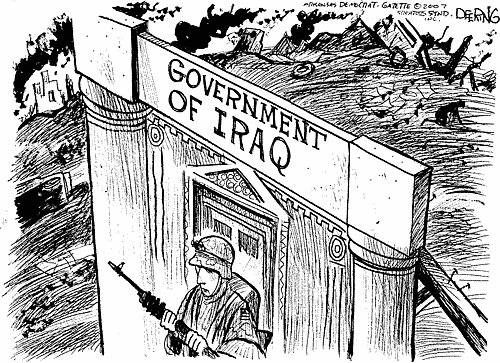Monday, February 12, 2007
Reuters: Bombs ravage Baghdad markets, killing 88



Bombs ravage Baghdad markets, killing 88
By Ibon Villelabeitia 1 hour, 9 minutes ago
BAGHDAD (Reuters) - Bombs laid waste to crowded markets in central Baghdad on Monday killing 88 people as Iraqis marked the first anniversary of a Shi'ite shrine bombing that pushed the country to the brink of civil war.
Iraq had no future unless a U.S.- backed offensive against militants in Baghdad succeeded.
In the deadliest attack, simultaneous blasts pulverized Shorja market, Baghdad's oldest, killing 79 people, destroying vendor stalls and setting ablaze an eight-story warehouse. Police said 165 people were wounded.
The Shorja market, the main supplier for countless small shops in Baghdad and central Iraq, has been bombed frequently.
A separate roadside bomb at the Bab al-Sharji market, also in central Baghdad, killed nine people and wounded 21.
The timing of the noon bombings, on the anniversary by the Islamic calendar of the destruction of the Golden Dome Mosque, appeared aimed at fanning sectarian strife as U.S. and Iraq forces step up a security plan in the capital, seen as a last chance to avert all-out war between majority Sh'ites and Sunnis.
An Interior Ministry spokesman said three car bombs exploded in quick succession at Shorja.
However, Major-General Abdul Rasool al-Zaidi from the Civil Defense Authority told state television the carnage was caused by five simultaneous roadside bombs around the warehouse.
Huge clouds of black smoke and flames belched from the building, which houses wholesale clothing merchants, turning a cloudless day into night in the debris-strewn street.
The blasts echoed across Baghdad and reduced stalls to mangled wrecks. People with wooden carts carried wounded survivors with bandaged legs, arms and heads. By nightfall columns of thick smoke still loomed over the city. There were reports that the blasts had ignited a plastics market.
"I saw three bodies shredded apart. Paramedics were picking up body pieces and human flesh from the pools of blood on the ground and placing them in small plastic bags," said witness Wathiq Ibrahim. "The smoke turned the place dark."
The Interior Ministry spokesman said three suspects had been arrested.
One old woman cursed Maliki's government. "They've killed all our sons. What have they left for us?" she shouted.
RESTRAINT URGED
Maliki, who has pledged to crush militants regardless of their sect, said Iraqi security forces were gradually stepping up their deployment in Baghdad.
"We have a great confidence that Iraqis have realized that no one has a future in this country if we don't terminate the terrorists," he said after holding 15 minutes of silence in remembrance of the Samarra bombing, which under the Gregorian calendar occurred on February 22, 2006.
President Bush has said he will send 21,500 more troops to Iraq. Most of them will head to Baghdad to help strengthen Maliki's fragile grip on the lawless city.
Previous attempts to halt bombings and death squad killings in the capital have failed.
Earlier, Iraq's top Shi'ite cleric, Grand Ayatollah Ali al- Sistani, urged followers not to seek revenge against Sunnis. Sistani said the Samarra bombing, blamed on Sunni militants, had plunged Iraq into a cycle of "blind violence."
Tens of thousands of Iraqis have been killed in a wave of sectarian attacks triggered by the destruction of the Samarra mosque, one of the holiest in Shi'ite Islam. Hundreds of thousands have been displaced to flee sectarian cleansing.
"We call on the believers as they mark this sad occasion and express their feelings ... to exercise maximum levels of restraint and not to do or say anything which would harm our Sunni brothers who are innocent for what happened and who do not accept it," Sistani said in a statement.
The reclusive Sistani, who lives in the holy city of Najaf, is regarded as a voice of moderation. Sistani, who heads the Shi'ite religious establishment, or Marjaiya, has repeatedly urged Shi'ites not to get sucked into sectarian conflict.
(Additional reporting by Ross Colvin, Mariam Karouny and Dean Yates, Mussab al-Khairalla and Reuters pictures)